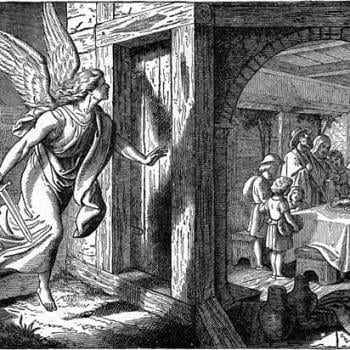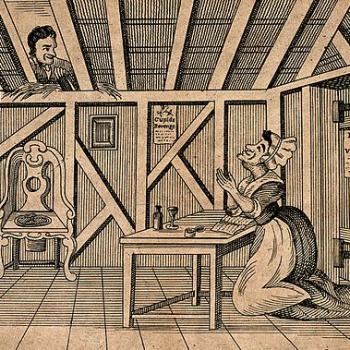Lectionary Reflections
1 Samuel 2:18-20, 26
December 27, 2015
We all know that the Sunday after Christmas, like the first Sunday after Easter, are among the most sparsely attended times of the church year. You will be there (unless of course you have an associate who will lead, while you head for a warmer clime) because you are paid to be there; some musician or other will show up, usually a substitute; Aunt and Uncle Williams will be there, because they come no matter what day it is. A few very reluctant kids, either accompanied by their parents or dropped off by them, fidgeting in the first row, along with a sleepy usher or two, will make up the crowd. If the weather is bad, one or two of these will not be in attendance either. And a happy Lord's Day to you!
This is no time to upbraid those sluggards who have slept in; you are not preaching to them in any case. So, just who is your audience this Sunday, besides God of course? Let me suggest that the chief listener today is you, the preacher. This hardly implies that you are not a listener to your other sermons, but since so few have come today, it is the perfect time for you to hold a conversation with yourself. If the tiny crowd wishes to listen in, they are more than welcome.
It is in a certain sense the beginning of a new year of your ministry. I know that the Christian year began on the first Sunday of Advent, but I also know that January 1 looms, and new beginnings are on everyone's mind. So, why not start your resolutions today, based on an evaluation of just what you think you are doing as minister of this congregation? What precisely is your work here, with this particular group of God's people? Are you ministering with them or at them or to them? Or are you attempting in one way or another to master them, to use them for your own benefit? That last may sound harsh, but I wonder if it might help us to be more blunt and bold as we reflect on the work we have been called to do.
I think 1 Samuel 2 may help us in our reflection. I think I know why this text has been chosen for this Sunday. Samuel is a young boy, and he has been left at the temple of Shiloh by his mother Hannah as a fulfillment of the vow that she made to YHWH: if YHWH would grant her a son, she would "lend" him (Hebrew sh'aul) to YHWH as priest for his entire life. There is a lovely pun in this word, one that moves in several directions. The verb "to lend" (sh'al) can mean lend or give, but it can also mean "ask." When Hannah names her son Samuel, she claims that name is based on the verb "to ask" (1 Sam. 1:20). That is a possible meaning, but the usual meaning of the verb "to ask" leads us to the name Saul, not Samuel, which clearly means "God hears." Thus, Samuel's naming prefigures the later deep conflict with the first king of Israel.
So the very young Samuel is left in Shiloh under the tutelage of the aged and ineffectual priest, Eli. This story bears echoes of the New Testament stories found in Luke's gospel where the very young Jesus is left (in this case inadvertently) in the temple by his parents. When they find him, he is astounding the learned men of the place, along with his frantic parents, with his great wisdom (see Luke 2:41-52). Also, in the previous story in Luke, Jesus is presented in the temple as an infant and is spoken of in portentous ways by Simeon and the aged Anna to the amazement of his parents (again!) (Luke 2:22-38). I imagine we are to remember those New Testament tales as we read this one. But I suggest that we can do that another time; today I wish to focus on my ministry in the light of this story.
In 1 Samuel 2:18 we are told that Samuel was "ministering before the face of YHWH, a young boy dressed in a linen ephod." The word "minister" (sharet) is usually used in a very technical sense as the actions of a priest, sacrificing, leading worship, etc. To emphasize the role Samuel is playing, he wears the classic garment of the priests, an ephod. This is a short and rude loincloth, setting aside its wearer as a member of the clergy of the day. (Later, in 2 Samuel 6, we will witness the warrior/king David donning an ephod and whirling and dancing as he brings the Ark of the Covenant up to Jerusalem as the crowning glory of his ascension to the kingship of a united Israel. His furious wife, Michal, accuses him of "exposing himself" like some common buffoon before even his lowliest servants. It appears that one of David's goals when he slipped the tiny ephod on over his powerful and muscular body was precisely to expose himself to his people as their potent king!) In this story Samuel has very early in his boyhood assumed the role of priest at Shiloh.
The story adds a delightful and touching bit, when we are told that Hannah, his mother, would come each year for sacrifice to Shiloh and bring her son a "little robe" (1 Sam. 2:19). Hannah may have felt the necessity of "lending" her son to YHWH to fulfill her vow, but she has hardly forgotten the little boy; one can picture her each year lovingly sewing a slightly larger robe to give to Samuel as he grows. I can imagine that robe was a welcome gift, a larger and warmer covering than the ephod, helping the boy to withstand the cold winters of the isolated northern shrine.





